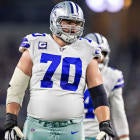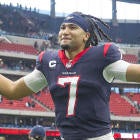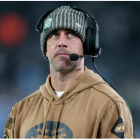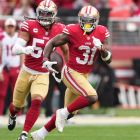ATLANTA -- Several years ago at the annual NFL Spring Meeting, while standing in the sprawling hallway of a swanky resort as high-ranking team and league officials began to pour out of a conference room for lunch, an associate asked me a question that resonates even more loudly today.
The individual, at the time a person of considerable heft in football circles, wondered aloud that if I sat in that hallway all day, how many people of color -- excluding coaches -- would be among those scampering in and out of meeting rooms in their smart business suits? It's something that has run through my head in the years since, spending countless hours hanging around and waiting for such meetings to conclude, and it's a dynamic hardly lost on those at the league office as well.
For two days in Atlanta this week, the NFL hosted a Quarterback Coaching Summit, trying to identify a pipeline of diverse coaches on the offensive side of the ball in the pro and college ranks who can hopefully rise to become head coaches themselves. Coaches and general managers spoke frankly and passionately about the problems they face during the symposium, trying to address the issue at the grassroots level. And they did so knowing that the power structure within the league -- owners and team presidents and GMs -- are almost entirely white, and there is a dearth of people of color in a position to hire in football.
The recent decision of Minnesota Vikings highly-esteemed team president Kevin Warren, one of the most prominent African American front office executives in the NFL, to depart to become commissioner of the Big Ten was a topic of private conversation at the summit as well, as one might expect. The topic seems more timely now than ever, with Ravens ex-general manager Ozzie Newsome now in a reduced role, with the number of diverse head coaches dwindling, with a slew of African American general managers let go in recent years without landing anything close to similar positions elsewhere (Jerry Reese, Ray Farmer, Martin Mayhew, Rod Graves, Sashi Brown, Doug Whaley and Reggie McKenzie come to mind), and with the Houston Texans, in the eyes of many, making a mockery of the Rooney Rule with their "general manager search" this month.
The issue runs deeper than just at the head coaching level. The NFL is searching for ways to address the lack of diversity in all disciplines of football -- beyond just the coaching and GM ranks -- and it is a cause that Troy Vincent, the league's head of football operations and one of the hosts of this event at Morehouse College, is championing.
"Here (at the summit) we are primarily talking about the quarterback coaches and play-callers," Vincent told me. "But what we should be looking at -- which we have -- is diversity across the entire spectrum, and that includes team presidents and ownership groups, that's the accountants and that's the lawyers, that's marketing, that's media. But it's easy for us to just focus on what the public sees, and that's the head coach and the play-caller. We have to be intentional around each of these disciplines."
As we sit mere weeks away from the start of 2019 training camp, about to kick off the NFL's 100th season, you can count on two hands the number of true high-ranking non-white decision-makers among the 32 member clubs. There is just one managing ownership group (not counting minority partners): Shad and Tony Khan in Jacksonville. There are just four non-white head coaches and just two general managers (Chris Grier in Miami and Doug Williams in Washington, though Williams does not have final say over personnel decisions and Bruce Allen is in fact Washington's highest-ranking football operations official). And, as conversations about the topic have intensified around the league with Warren's abrupt departure, I've had several people opine about the lack of diversity across the board.
It begs the question of whether the demographics of these positions will actually change significantly from the top down, or if more systematic changes must be made in the way individuals achieve these positions in the NFL. Will it take more people of color atop team front offices to see more people of color serving as coaches and general managers?
"It goes hand in hand," Vincent said. "That's both hands. You need both. You need those that are actual decision-makers to be inclusive as well. What we're doing here is were just looking to have an inclusive process; we're not looking for any handouts.
"So that's an inclusive process. It has to go across the entire spectrum. But it's easy to focus in on the sports car, but the person who is actually making the decision -- he or she has to have that same mindset. Diversity is good business, and it's also the right thing to do."
Vincent is working closely with Rod Graves, the former Cardinals GM who left a position with the NFL to take over the Fritz Pollard Alliance, which oversees issues of diversity with the league, to try to curb the recent tide. After recently pursing every NFL team website for hours, researching the men and women listed in EVP and SVP positions -- the type of execs who represent clubs at owner's meetings -- the results were, frankly, troubling. This was not an examining of middle managers -- pro personnel guys and scouting directors -- but the types of individuals listed in the top half dozen or so front office positions.
The league has made far greater strides embracing leadership roles for women -- team after team had women in EVP roles -- especially as it pertained to legal or finance matters, in what seems to be a refreshing, growing trend. But by and large those women were white, and in many cases they were related to the owner. As for diversity in background, besides Newsome (now listed as an EVP within the personnel department but whose voice within that organization has been prominent) and Williams and Grier, you have Omar Khan (Steelers Vice President of Football and Business administration) and Paraag Marathe (49ers President of 49ers Enterprises and EVP of Football Operations essentially rounding out those of color in top positions on the football side of things. In the entire league.
Stephen Choi (Washington CFO), Husain Naqi (Jags SVP of International Development, Megha Parekh (Jags SVP and chief legal officer), Brandon Etheridge (Ravens general counsel) and Ed Goines (Seahawks CFO and General Counsel) carry considerable financial and legal titles. Besides the Khans in Jacksonville, there are 49ers "co-owners" Gideon Yu, who became the first person of color to hold a team president title in the NFL in 2012, and Mark Wan, though the York family has the controlling interest.
"This clearly is an issue at the executive level, as well as the head coach level," Graves said, "and until owners embrace diversity as part of their business plan we will be slow to make the kind of improvement that I think is necessary. And I think diversity is good for the league, and good for business …
"There are a number of teams out there that do an excellent job, and you see the effects of what I call the diversity of leadership, but I think by and large it has not been a total commitment. Because what we understand about diversity is it has to be intentional, and that's what we've seen with the NBA and the message we see in corporate America in some spots. But I think in order for it to really work and be effective it has to truly be a commitment. And that's what we're working towards."
Several of his peers around the league said that frustrations over the lack of progress on these matters weighed heavily of Warren for years, concerned about whether the scope of the Rooney Rule was broad enough and whether teams were conducting searches that were truly in the spirit of the rule's intent. Warren did not respond to messages seeking comment, but several who were close to him in the league said that they have shared concerns over the lack of diversity atop the NFL pyramid for years, and expressed consternation over how to make it more representative of the men who perform on the field and more representative of all various walks of society.
"If you look around the room at a league meeting, at who really represents each team, there just isn't much diversity," said one NFL team executive. "It really doesn't seem to change. And on the football side, Ozzie and Doug are both in their 60s and Paraag's role has sort of changed and they brought in Al Guido as a team president there, too. It actually seems headed in the wrong direction.
"How many people of color are really moving up and taking that next step? Are they really getting that opportunity? Is the Rooney Rule really working? Houston brings in (former GMs) Martin Mayhew and Ray Farmer right away and then doesn't hire a GM -- is that why the rule was put in place?"
These issues go well beyond football, and remain something corporate America has grappled with for years. But when the demographics of those who play the game at the highest level as so heavily skewed in the opposite direction, and with several of the long recognizable African American coaches no longer employed in such roles (Marvin Lewis, Jim Caldwell and Tony Dungy, for starters), it's clear the NFL has considerable work to do. The Texans opting to hire no GM at all -- after they couldn't land intended target Nick Caserio of the Patriots -- despite interviewing Mayhew and Farmer, has irked many, and did not go unnoticed at the Fritz Pollard Alliance either, and concerns have been raised about several GM searches in recent years.
"I go back to -- are you really making diversity a priority?" Graves said. "And I understand, having worked in the NFL, where you establish relationships and you like to be around people you are comfortable with and who you have a history with in the past. I get that part of it.
"But all that we have asked is for there to be an open and fair process of evaluation, and if there's not going to be one, then let's not make a sham of the Rooney Rule. And that to me, again, goes back to what is the commitment to diversity? And we clearly understand that diversity is good business for the league. I believe it is, and other teams have shown that to be true."
Vincent and Graves both pointed to the Falcons, Cardinals and Vikings as teams always wiling to embrace the cause. Vikings GM Rick Spielman, the only white NFL coach or GM who attended, spoke emotionally about the two quality coach positions his owners agreed to add to the staff, which they are using to broaden the diversity of their staff. He hopes other organizations take note, with a commitment from ownership the clearest path to altering the league's current state of affairs.
"That's when hopefully we see some breakthrough," Spielman told the group.
Perhaps others are listening too, well beyond the scope of those sitting in conference rooms at the QB Coaching Summit. There are no shortage of qualified candidates that sincerely hope that is the case.


















